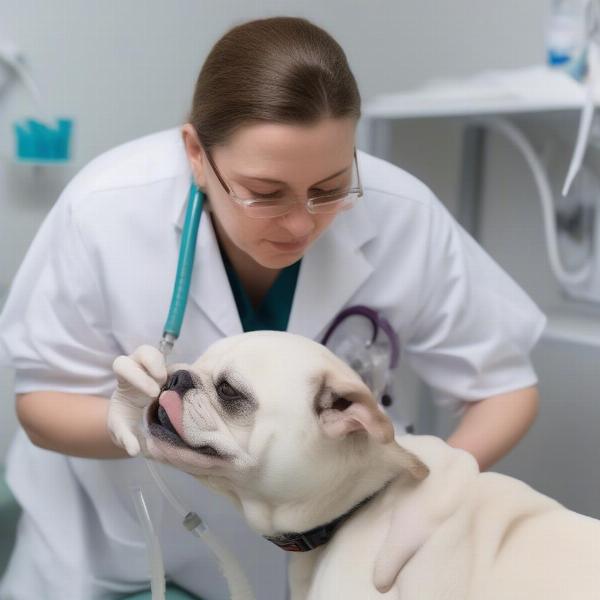Soft palate surgery in dogs is a common procedure to address breathing problems. Understanding what to expect before and after the surgery is crucial for a smooth recovery. This article provides a comprehensive guide for dog owners navigating this process, covering everything from pre-operative preparations to post-operative care and potential complications.
Preparing for Your Dog’s Soft Palate Surgery
Before the surgery, your veterinarian will conduct a thorough examination, including blood tests and possibly X-rays, to assess your dog’s overall health and ensure they are fit for anesthesia. You’ll receive detailed instructions on pre-surgery fasting requirements. Typically, food is withheld for 12 hours prior to the procedure, but water may be allowed up to a few hours before.
 Pre-surgery examination for a dog
Pre-surgery examination for a dog
What Happens During Soft Palate Surgery?
The procedure involves shortening the soft palate, which is the fleshy tissue at the back of the throat, to improve airflow. In some cases, excess tissue around the nostrils may also be removed. The surgery is performed under general anesthesia and typically lasts about an hour.
Soft Palate Surgery Dog: Post-Operative Care is Key
Post-operative care is vital for a successful recovery. Your dog will need close monitoring for pain, swelling, and any signs of infection. Pain medication will be prescribed, and it’s important to administer it as directed by your veterinarian. Your dog will need to wear an Elizabethan collar (e-cone) to prevent them from licking or scratching the surgical site. common dog surgeries
Managing Your Dog’s Pain and Discomfort
Pain management is critical after soft palate surgery. Your veterinarian will prescribe pain medication to keep your dog comfortable. It’s essential to follow their instructions carefully and administer the medication on schedule. Signs of pain can include restlessness, whining, and decreased appetite.
Dietary Adjustments Post-Surgery
Your dog will need to eat soft food for several weeks after surgery to avoid irritating the surgical site. You can offer canned food, softened kibble, or specially formulated recovery diets. Ensure fresh water is always available. soft palate surgery dog
Potential Complications and When to Seek Help
While soft palate surgery is generally safe, complications can occur. These may include bleeding, infection, swelling, or difficulty swallowing. Contact your veterinarian immediately if you notice any of these signs, or if your dog experiences any breathing difficulties or excessive drooling.
Long-Term Outlook and Recovery
Most dogs recover fully from soft palate surgery and experience significant improvement in their breathing. Regular check-ups with your veterinarian are essential to monitor progress and address any potential long-term issues.
Conclusion
Soft palate surgery can significantly improve the quality of life for dogs struggling with breathing problems. By understanding the before and after care requirements, you can help ensure a smooth recovery for your furry friend. Remember to follow your veterinarian’s instructions diligently and contact them if you have any concerns.
FAQ
- How long does it take for a dog to recover from soft palate surgery? Most dogs recover within two to three weeks.
- What are the signs of complications after soft palate surgery? Signs include excessive bleeding, swelling, difficulty breathing or swallowing, and discharge from the surgical site.
- Can my dog eat normally after soft palate surgery? No, your dog will need to eat soft food for several weeks following the surgery.
- Is soft palate surgery painful for dogs? The procedure is performed under general anesthesia, so your dog will not feel pain during the surgery. Pain medication is provided post-operatively to manage discomfort.
- How much does soft palate surgery cost for a dog? Costs vary depending on the veterinarian and location, but it typically ranges from several hundred to a few thousand dollars.
- What are the alternatives to soft palate surgery for dogs? In some cases, medical management with medications or weight loss may be an option, but surgery is often the most effective treatment.
- Can all breeds of dogs have soft palate surgery? Yes, but brachycephalic breeds are more commonly affected by soft palate issues.
ILM Dog
ILM Dog is a leading online resource for dog owners worldwide, providing expert advice and practical information on all aspects of dog care, from breed selection and health to training, nutrition, grooming, and more. We strive to empower dog owners with the knowledge they need to provide the best possible care for their canine companions. Whether you’re a seasoned dog owner or just starting out, ILM Dog is your trusted source for reliable, up-to-date information. For inquiries regarding dog health, breed-specific advice, or any other dog-related concerns, reach out to our expert team at [email protected] or call us at +44 20-3965-8624.